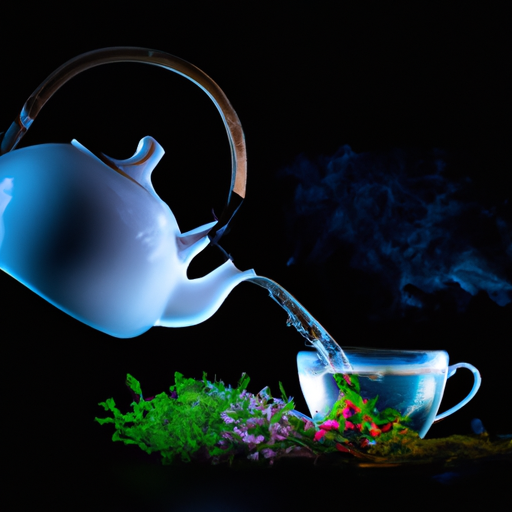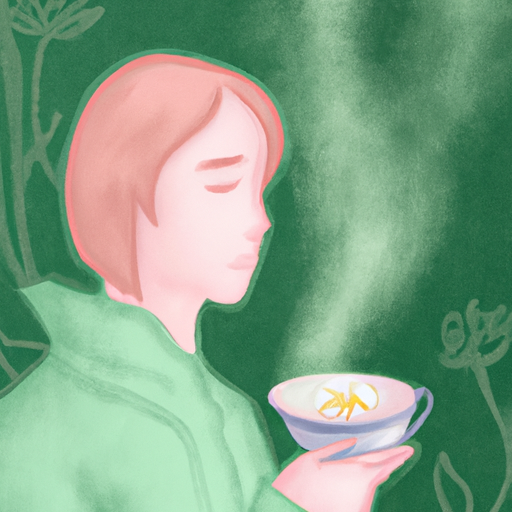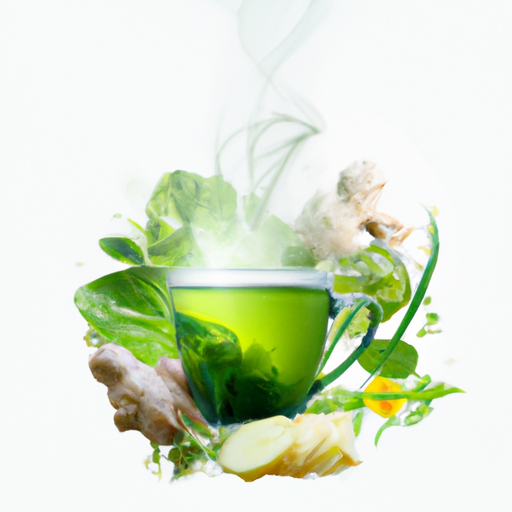Were you aware that herbal tea has been utilized for generations to enhance health and overall wellness?
In fact, studies have shown that herbal teas can help improve digestion, reduce inflammation, and even boost the immune system.
If you’re looking to brew a delicious and beneficial cup of herbal tea, you’ve come to the right place. In this article, I will guide you through the steps of brewing the perfect cup of herbal tea, using my own expertise and experience.
From choosing the right blend to adding optional sweeteners or flavorings, I will provide you with all the tools you need to create a soothing and flavorful cup of tea.
So, grab your supplies and get ready to embark on a journey of aromatic and delicious herbal tea brewing.
Key Takeaways
- Choosing the right teapot made of ceramic or glass is essential for brewing herbal tea.
- Water temperature is important when brewing herbal tea, with delicate teas requiring lower temperatures and stronger teas requiring hotter water.
- Accurate measurement of tea is crucial for a well-balanced cup of tea.
- Steeping techniques and optimal steeping times vary for different types of herbal tea.
Choose Your Herbal Tea Blend
Now that you’ve decided to brew some herbal tea, it’s time to choose your perfect blend!
There are so many different types of herbal teas to choose from, each with its own unique flavors and health benefits. Whether you’re looking for something calming and soothing like chamomile, or something invigorating like peppermint, there’s a blend out there for everyone.
Herbal teas have been used for centuries for their various health benefits, such as aiding digestion, boosting the immune system, and promoting relaxation. Some blends even have specific benefits, like ginger for an upset stomach or lavender for stress relief.
So take a moment to explore the different options and find the blend that suits your taste and health needs. Once you’ve chosen your perfect blend, it’s time to gather your supplies and start brewing!
Gather Your Supplies
First, make sure you have all the necessary supplies. When brewing herbal tea, choosing the right teapot is essential. Opt for a teapot made of ceramic or glass, as they retain heat well and won’t interfere with the flavors of your tea. Avoid using metal teapots, as they can alter the taste.
Additionally, consider the importance of water temperature. Different herbal teas require different water temperatures to bring out their optimal flavors and health benefits. Herbal teas with delicate flavors, such as chamomile or mint, should be brewed with water that’s just below boiling point, around 190°F to 200°F. Stronger herbal teas, like ginger or hibiscus, can handle hotter water, around 200°F to 212°F.
Now that you have your teapot and know the right water temperature, let’s move on to the next step: measuring your tea.
Measure Your Tea
To ensure the perfect balance of flavors and achieve a delightful aromatic experience, it’s crucial to accurately measure the amount of tea you’re using. Proper measuring techniques are key in brewing a good herbal tea. The importance of accurate measurements cannot be overstated. Too little tea and your brew will lack flavor, while too much can result in an overpowering taste. To help you achieve the ideal measurement, use the table below as a guide:
| Type of Tea | Amount per Cup |
|---|---|
| Loose Leaf | 1 teaspoon |
| Tea Bags | 1 bag |
| Herbal Blends | 1 tablespoon |
By following these measurements, you can ensure a consistent and well-balanced cup of tea every time. Now that you have measured your tea, it’s time to move on to the next step: heating your water.
Heat Your Water
Once you’ve measured your tea, it’s time to heat up your water, symbolizing the transformation from raw ingredients to a comforting and soothing beverage.
The temperature of the water plays a crucial role in extracting the full flavor and benefits from your herbal tea. Different teas require different water temperatures to achieve the optimum taste.
For delicate herbal teas like chamomile or mint, a lower temperature around 175°F (80°C) is recommended to prevent bitterness. On the other hand, robust teas like black or ginger may benefit from hotter water around 200°F (93°C) to bring out their bold flavors.
Additionally, using filtered water is essential to avoid any unwanted flavors or impurities that may affect the taste of your tea.
With your water perfectly heated, it’s time to move on to steeping your tea and unlocking its delightful essence.
Steep Your Tea
As you let the tea leaves dance in the hot water, their vibrant colors slowly infuse the liquid, creating a mesmerizing tapestry of flavors waiting to be savored.
To fully enjoy your herbal tea, it’s important to understand different steeping techniques and the optimal steeping time for each type of tea. Here are three sub-lists to help you enhance your tea experience:
-
Tea types and steeping techniques:
- Green tea: Steep at 170°F-180°F for 2-3 minutes to preserve its delicate flavors.
- Chamomile tea: Steep at 200°F for 5-6 minutes to extract its calming properties.
- Peppermint tea: Steep at 212°F for 3-4 minutes to release its invigorating aroma.
-
Optimal steeping time for herbal teas:
- Light-bodied teas: 2-3 minutes of steeping time.
- Medium-bodied teas: 4-5 minutes of steeping time.
- Full-bodied teas: 6-7 minutes of steeping time.
-
Experiment with steeping time:
- Try shorter or longer steeping times to adjust the strength of your tea to your preference.
Now, let’s explore how to add sweeteners or flavorings (optional) to enhance your herbal tea even further.
Add Sweeteners or Flavorings (Optional)
When it comes to adding sweeteners or flavorings to my herbal tea, I always opt for natural options. Natural sweeteners such as honey or maple syrup add a subtle sweetness without overpowering the flavors of the tea.
Additionally, I like to experiment with flavor enhancers like fresh herbs or citrus zest to add a refreshing twist to my brew.
Natural Sweeteners
To add some natural sweetness to your herbal tea, try using a small amount of honey or a dash of stevia. Honey, a delicious and versatile natural sweetener, not only enhances the taste of your tea but also offers numerous health benefits. It is rich in antioxidants and has antibacterial properties that can support your immune system. Additionally, honey can soothe a sore throat and help alleviate cough symptoms. If you prefer a zero-calorie option, stevia is a great alternative to sugar. It is derived from the leaves of the stevia plant and provides a sweet taste without adding any calories. Stevia is also known for its potential benefits in managing blood sugar levels. Now that we’ve explored natural sweeteners, let’s move on to flavor enhancers to further enhance the taste of your herbal tea.
Flavor Enhancers
Looking to add a little extra flavor to your cup of herbal goodness? Here are three ways to enhance the taste of your herbal tea:
-
Herb-Infused Oils: Add a few drops of herb-infused oils, such as lavender or peppermint, to your herbal tea for a burst of aromatic flavor. These oils not only enhance the taste but also provide therapeutic benefits.
-
Creative Tea Blends: Experiment with different combinations of herbs and spices to create your own unique tea blends. Mix chamomile with lemon balm for a soothing and refreshing cup, or blend rosemary with sage for a savory and invigorating flavor.
-
Citrus Zest: Grate some fresh citrus zest, like orange or lemon, into your herbal tea to add a zingy and tangy twist. The citrus oils from the zest will infuse into the tea, creating a bright and refreshing taste.
With these flavor enhancers, you can elevate your herbal tea experience to new heights. Now, let’s move on to how to enjoy your perfect cup of herbal tea.
Enjoy Your Perfect Cup of Herbal Tea
Savor the delightful aroma and flavors of your perfectly steeped herbal tea. Herbal teas come in a variety of flavors, each offering unique taste profiles and health benefits. Understanding the differences in herbal tea flavors can help you choose the one that suits your palate and wellness needs. From the soothing chamomile to the invigorating peppermint, there is a flavor for every mood and occasion. Herbal teas are known for their numerous health benefits, such as boosting the immune system, aiding digestion, and promoting relaxation. To enhance your enjoyment further, consider adding natural sweeteners like honey or a twist of citrus to complement the flavors. So sit back, relax, and let the enchanting blend of flavors and well-being wash over you.
| Flavors | Health Benefits |
|---|---|
| Chamomile | Promotes relaxation |
| Peppermint | Aids digestion |
| Lavender | Reduces stress |
Frequently Asked Questions
Can I mix different herbal tea blends together?
Yes, you can mix different herbal tea blends together. Combining herbal teas allows for a unique flavor profile and potential health benefits. Experiment with various combinations to find the perfect blend that suits your taste and desired effects.
How long should I let my herbal tea steep for?
Letting herbal tea steep for the right amount of time is crucial for optimal flavor and benefits. Generally, steep loose leaf herbal tea for 5-7 minutes. Properly store herbal tea in an airtight container away from sunlight and moisture.
Can I reuse the tea leaves for a second infusion?
Yes, you can reuse tea leaves for a second infusion. This has the benefit of extracting different flavors and aromas from the leaves, creating a unique drinking experience with each infusion.
What is the recommended water temperature for brewing herbal tea?
The recommended water temperature for brewing herbal tea is around 200°F. Using filtered water enhances the flavor and quality of the tea, as it removes impurities and allows the natural aromas and flavors to shine through.
Are there any herbal teas that are not safe to consume during pregnancy?
During pregnancy, it is important to be cautious about consuming herbal teas. Some herbal teas may not be safe and can affect fertility. It is recommended to consult with a healthcare professional before consuming any herbal tea during pregnancy.
Conclusion
In conclusion, brewing a good cup of herbal tea is an art that brings tranquility to my soul. With the right blend of herbs, precise measurements, and a gentle steeping process, I’ve created a masterpiece that warms my heart and calms my mind.
As I take a sip of this aromatic elixir, I’m transported to a serene garden, where the flavors dance on my tongue like a symphony of tranquility.
So, go forth and embrace the magic of herbal tea, for it’s a remedy for the soul.










